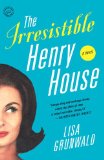Summary | Excerpt | Reading Guide | Reviews | Beyond the Book | Readalikes | Genres & Themes | Author Bio

A Novel
by Lisa GrunwaldChapter One
Welcome Home, Henry
By the time Henry House was four months old, a copy of his picture was being carried in the pocketbooks of seven different women, each of whom called him her son.
The photograph showed Henry on the day he arrived at Wilton College in 1946. He was lying naked in his crib, his backside bare and sassy, his hair already shiny and dark, and his grin already firmly in place as he pulled up on his chubby hands and turned back toward the sound of his name.
Henry House was a practice baby, an orphan supplied by the local home for the purpose of teaching college women how to be proper mothers. For more than two decades, since the early 1920s, colleges across the country had offered home economics programs featuring practice kitchens, practice houses, and, sometimes, practice babies. Henry was the tenth such baby to come to the Wilton practice house. Like the other so-called House babies before him, he was expected to stay for two years and be tended to in week-long shifts by a half dozen practice mothers. In earnest, attentive rotations, they would live and sleep beside him as they learned the science of child rearing—feeding and diapering, soothing and playing—until it was time to pass him on to the next devoted trainee.
Raised, as a consequence, not with a pack of orphans by a single matron but as a single orphan by a pack of mothers, Henry House started life in a fragrant, dust-free, fractured world, where love and disappointment were both excessive and intertwined.
in 1946, the campus of wilton college sat like a misplaced postage stamp in the upper-left-hand corner of the mostly flat, still mostly rural Pennsylvania rectangle. Established in 1880, the college was one of the oldest in the country created solely for the education of women, and it drew, in nearly equal numbers, girls from the nearby farms and girls from the distant towns and girls from the glittering, ambitious East. If some arrived with the thought that home economics would offer an easy path, they had only to enter the practice house to be disabused of this notion.
Martha Gaines ran the program with an iron fist and a hidden heart, living full-time in the practice house while the undergraduates came and went. Martha considered the building hers, the students hers, the program hers. In 1926, she had been reassigned from her original post as a textiles instructor to design and run the practice baby program, and she had been in charge since the arrival of the very first House infant. Martha had overseen all the House babies since then, the single exception being during the previous year, when she had been urged (the gossip, she knew, said forced) to take a leave of absence. On this sharp, brisk autumn morning, with a new school year, a new group of mothers, and a new baby before her, Martha had never felt a deeper need to be in command.
Henry was in her arms. He was wearing bright red cotton pajamas and was wrapped, budlike, in a pale green cotton blanket. The date of his birth—June 12, 1946—had been written on a piece of orphanage stationery and fixed to his blanket with a large diaper pin. The orphans always arrived with numbers and, thanks to Martha’s one streak of whimsy, stayed on with cutely alliterative names: Helen House, then Harold House, then Hannah, Hope, Heloise, Harvey, Holly, Hugh, and Harriet. Only when they were adopted—which they invariably were, quite eagerly, as the prized products of modern child-rearing techniques—would they finally be given real names.
At the door of the practice house, Martha now exhaled a homecoming sigh, then expertly shifted the baby onto her left arm to open the door with her right.
“Welcome home, Henry,” she whispered, stepping into the entranceway and turning on the light.
Then she kissed one of the baby’s tiny, still-clenched hands—not his face, of course, for she rarely deviated from the rules she imposed on her student mothers, and one of those rules was not to indulge in undue physical affection. (“mother must not begin with s” was the admonition that Martha had stitched as a sampler years before.)
Excerpted from The Irresistible Henry House by Lisa Grunwald Copyright © 2010 by Lisa Grunwald. Excerpted by permission of Random House, a division of Random House, Inc. All rights reserved. No part of this excerpt may be reproduced or reprinted without permission in writing from the publisher.
Your guide toexceptional books
BookBrowse seeks out and recommends the best in contemporary fiction and nonfiction—books that not only engage and entertain but also deepen our understanding of ourselves and the world around us.